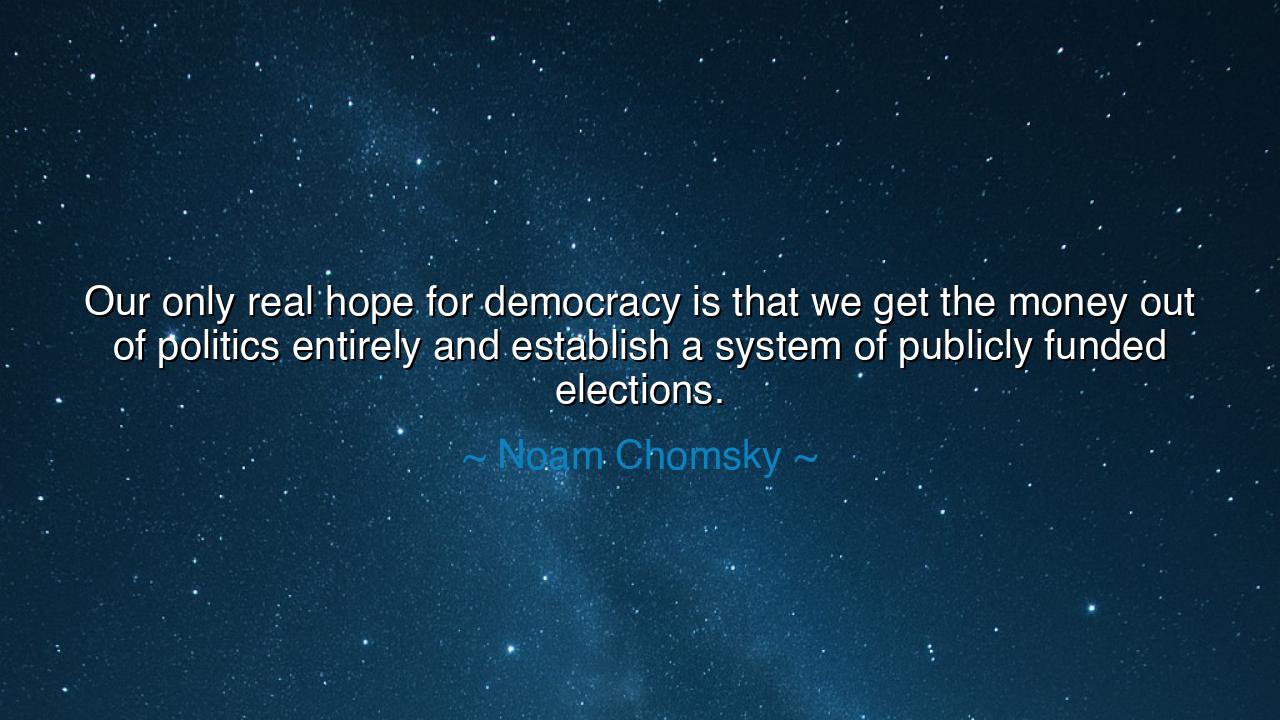
Our only real hope for democracy is that we get the money out of
Our only real hope for democracy is that we get the money out of politics entirely and establish a system of publicly funded elections.






“Our only real hope for democracy is that we get the money out of politics entirely and establish a system of publicly funded elections.” — thus declared Noam Chomsky, the philosopher of dissent and conscience of the modern age. His words strike like a hammer against the hollow shell of power, echoing through the marble halls where democracy has too often been sold to the highest bidder. In this saying, Chomsky speaks not merely of money or politics, but of the eternal struggle between power and principle, between the pure will of the people and the corrupting influence of wealth. His call is not for reform alone, but for redemption — for the restoration of the sacred bond between the governed and those who claim to govern.
At the heart of his warning lies a truth as old as civilization: where wealth rules, justice falters. In the ancient republics of Greece and Rome, philosophers and statesmen alike warned that when gold enters the forum, the voice of the citizen is silenced. Democracy, they said, can only live when each person, rich or poor, has an equal voice in the shaping of their destiny. But when the coins of the powerful begin to outweigh the votes of the many, democracy withers into plutocracy — the rule of the few over the many, the shadow of freedom wearing the mask of choice. Chomsky’s words are a lament for this slow decay, and a battle cry to reclaim the purity of self-government before it is lost.
He speaks from the vantage of history, for he has seen how the market devours all things — even the instruments of liberty. In his time, the halls of democracy became marketplaces, where campaigns were auctions, and promises were traded for profit. The people, meant to be sovereign, became spectators in a theater of illusion. Corporations, with their endless wealth, shaped policy; lobbyists whispered in the ears of kings disguised as representatives. And so Chomsky, with the sorrow of a prophet and the sharpness of a scholar, declared that if money is not driven out, freedom itself will flee.
Consider, for a moment, the story of ancient Athens, cradle of democracy and cautionary tale alike. In its early days, the citizens gathered in the Agora — the open square — to debate laws as equals. But as empire grew, so too did greed. Wealth began to corrupt the process, and the voices of common men were drowned beneath the weight of silver. The system that had once been a living dialogue between free people became the tool of oligarchs. In the end, democracy did not die by invasion; it died by purchase. This ancient cycle repeats in every age where money becomes the god of politics. Chomsky’s cry, then, is a plea to break that cycle — to ensure that power returns to the people, where it rightfully belongs.
To call for publicly funded elections, as Chomsky does, is to imagine a rebirth of democracy. It is to envision a system where leaders owe allegiance not to their benefactors, but to their citizens; where the strength of a campaign is measured not by the weight of its purse, but by the depth of its ideas. Such a vision demands courage, for it challenges the entrenched power of those who profit from division and deceit. Yet, it is the only path forward if democracy is to live beyond illusion — if it is to be not a marketplace, but a covenant.
His warning is both moral and practical: a nation that allows money to rule politics invites corruption to rule conscience. The danger is not only in unjust laws or unfair elections, but in the corrosion of faith itself. When citizens no longer believe that their voices matter, apathy replaces engagement, and tyranny rises not by force, but by surrender. A people who lose faith in democracy soon cease to defend it. And when that day comes, freedom dies quietly — not with chains, but with indifference.
Therefore, my listener, take heed. The wisdom of Chomsky is not a condemnation, but a summons — a call to action worthy of the ancients. Demand transparency. Guard the sanctity of your vote as you would guard your life. Refuse to sell your voice for the hollow comfort of propaganda. Raise your children to believe that citizenship is a sacred duty, not a spectator sport. And above all, remember this: democracy is not a gift; it is a fire that must be tended, or it will burn out.
For if money is the fire that consumes, hope is the water that renews. Chomsky’s vision is not despair, but faith — faith that humanity can still rise above greed, that the voice of truth can still outsing the voice of wealth. Let every generation, then, take up this torch: to cleanse the public square of corruption, to rebuild the temple of democracy not on gold, but on justice. For only when the people are once again the masters of their own destiny can we say, with pride and certainty, that freedom still lives.






AAdministratorAdministrator
Welcome, honored guests. Please leave a comment, we will respond soon